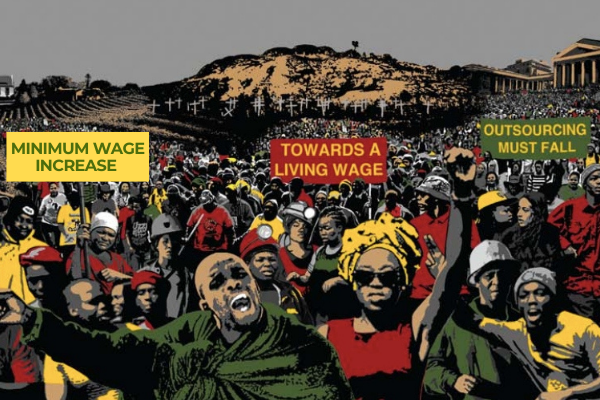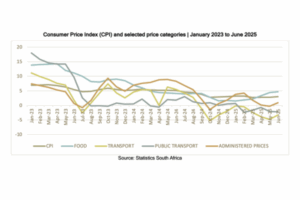Background
One of the important achievements by South Africa’s government in positively addressing the plight of poverty, wage inequality and unemployment in the country has been the introduction of a National Minimum Wage Act (NMWA), which was promulgated on the 1st of January 2019.
The introduction of a National Minimum Wage (NMW) in South Africa is a significant labour market intervention that could benefit about six million workers. These workers are generally unorganised and vulnerable and without the introduction of the National Minimum Wage Act would have continued to endure exceedingly low wage levels and poverty.
Scope of the Commission to review
Section 6 of the NMWA mandates the Commission to conduct an annual review of the minimum wage and suggest adjustments to the Minister. Specifically, section 7 outlines the criteria for these adjustments:
(a) promote
(i) the medium-term targets [established in the Act];
(ii) the alleviation of poverty; and
(iii) the reduction of wage differentials and inequality.
It should consider a range of information on its impacts on employers and employees as well as the aims of reducing poverty and inequality. The information required includes:
- inflation, the cost of living and the need to retain the value of the minimum wage;
- wage levels and collective bargaining outcomes;
- gross domestic product;
- productivity;
- ability of employers to carry on their businesses successfully;
- the operation of small, medium or micro-enterprises and new enterprises;
- the likely impact of the recommended adjustment on employment or the creation of employment; and
- any other relevant factor.
Functioning of the NMWC
The Commission held its first meeting on the 26th February 2019. Since then, it has met five times. At these meetings, it has considered reports from the Department on measures to communicate and enforce the national minimum wage, including the communications plan and the number of inspections and the extent of disputes related to it, as reported by the Commission for Conciliation, Mediation and Arbitration.
In addition, the Commission commissioned the research described in the previous section and engaged with the researchers in two meetings, to strengthen the research and to gain insight into initial findings.
Research approach and methodology
During the negotiations at the National Economic Development and Labour Council (NEDLAC) which led to the promulgation of the NMWA, the social partners agreed that emphasis should be placed on the need for reliable research to support the Commission in the execution of its functions, primarily the review and adjustment of the national minimum wage.
As a result of that and considering time and budgetary constraints, the Commission, therefore, undertook to:
a) request funding from Employment Promotion Programme (EPP) to fast-track the sourcing of the research; and
b) outsource the research to the Development Policy Research Unit (DPRU) as a recognised research unit that has a strong focus on policy-relevant research in the fields of labour markets, poverty and inequality.
An agreement was therefore reached for EPP to provide funding to the DPRU to provide the Commission with a comprehensive quantitative and qualitative assessment of the labour markets. The assessment impact to be conducted by DPRU would rely heavily on labour market data from the Quarterly Labour force Survey (QLFS) administered by Statistics South Africa and will focus on the following:
- Changes in wages, controlling for structural and demographic characteristics and the resultant impact on wage inequality;
- Changes in employment, including shifts between formal and informal sectors and employment type;
- Changes in hours of work and other non-wage benefits (paid leave, sick leave etc.);
- The number of workers paid below the NMW and factors associated with higher non- compliance; and
- Changes in price inflation.
As there are other issues relevant to the required impact assessment that could not be assessed using quantitative data, DPRU then approached the Centre for Social Development in Africa (CSDA) at the University of Johannesburg to conduct the qualitative research on the narrative data from focus groups and individual interviews specifically focusing on:
- Knowledge of the NMW policy among workers and employers;
- How and if the NMW influences wages and other working conditions;
- Compliance with the NMW policy and/or the presence of unfair labour practices; Changes in workplace relations (collective bargaining);
- Examining the implications of the NMW for the well-being of low-wage households in urban and rural communities.
Challenges, risks and mitigation
The national minimum wage was implemented with the expectation of improving the low wage levels and inequality. However, the extent to which it does can only be assessed by undertaking an adequate policy assessment exercise based on the research.
The need to quantitatively identify the effect of the national minimum wage is indisputable to the work of the Commission, as it allows the measurement of its real effect and a comparison with the expected outcome. Furthermore, the assessment exercise will give the Commission essential and solid evidence for future adjustments on the national minimum wage.
In undertaking this exercise, the Commission has however experienced some challenges which have regrettably led to the delay in the reviewing of the national minimum wage.
Firstly, the researchers cautioned that accurately isolating the main effects of the NMW would require a reasonable time to have elapsed after the introduction of the NMW, and given that the NMW came into effect in January 2019, a comprehensive study on the short-term impacts in South Africa could not justifiably begin until after June 2020.
Secondly, there is an unavoidable time lag in the release of the quarterly survey that the researchers use to obtain the relevant labour market information that they need to accurately analyse the impact of the NMW.
According to DPRU, the QLFS is the most suitable data source for the NMW impact study as it covers approximately 30 000 households and contains detailed labour market information. The researchers, however, indicated that some information, for example, wage data collected in the QLFS is not released quarterly. The wage data from the QLFS is only released annually as the Labour Market Dynamics Survey (LMDS) which therefore means that the wage data for the first year of implementation of the NMW will only be available late in 2020.
To accommodate for this challenge, the Commission engaged the Statistician General to request an early release of the microdata which was subsequently approved. However, the data is released in tranches and the delay in gaining access to all the data has meant that the researchers haven’t been able to provide a comprehensive qualitative analysis of the NMW in time for our recommendations on the adjustment of the NMW in 2019.
Discussion
The Commission is cognisant of the timelines relating to the review of the national minimum wage, but is also cautious of the importance of examining key indicators that have occurred since the implementation of the national minimum wage in January 2019 and the extent to which any changes observed can be attributed to the new policy. Furthermore, it is important that credible evidence is available to allow the Commission to make informed recommendations that will better respond to the realities on the ground.
With the limited data available, the researchers have used six waves of the QLFS (2018Q1- 2019Q2) and have managed to present the Commission with descriptive data for the very short term on: wage shifts and non-compliance, employment shift as well as hours of work. It has, however, became evident that, based on the limited labour market statistics available for use by the researchers (only two quarters of 2019, the year of implementation), the credibility of the qualitative research would be questionable and the Commission would unfortunately not be able to make use of the limited analysis to inform its recommendation to the Minister on the adjustment of the NMW in 2019.
The Commission has therefore resolved to allow the researchers to obtain the rest of the tranches of the labour market statistics from Statistics South Africa to inform the quantitative part of the research and also to finalise the qualitative part of the research. This will enable the research to present a detailed quantitative and qualitative report later in a year to the Commission to allow it to make recommendations for the 2021 NMW adjustment.
Bearing in mind the obligation placed by the NMW Act on the Minister to annually review the NMW and the purpose of the Act of improving the wages of the lowest-paid workers and preserving the value of the NMW, the Commission has therefore agreed that for the 2020 adjustment, to recommend to the Minister to adjust the NMW by the Consumer Price Index (CPI) so as not to negatively impact on the livelihoods of vulnerable workers and also not negatively impact on the ability of businesses to operate successfully as the economy is currently experiencing a slump.
The Commission was of the opinion that granting a higher percentage increase, would require a public participation process, however, the tight timelines for the 2020 review process did not allow this to occur.
The main challenge is that the impact of the national minimum wage necessarily only emerges over time. Similarly, trends in the implementation of the minimum wage take time to become clear. In practice, there is an inevitable lag in the time required for Statistics South Africa to conduct the necessary surveys on earnings and employment, which provide the quantitative framework for analysing the impacts and implementation of the national minimum wage.
In light of these realities, the Commission couldn’t attempt a complete annual review of the minimum wage. Instead, it here proposes an initial adjustment to avoid erosion in the purchasing power of the minimum wage, and provides a progress report on the research commissioned for the annual review and on its own activities to date. A full annual review will be completed for 2020 when the required evidence is available, no later than November 2020 in order to inform the adjustments for 2021.
Included in that review will be the results of investigation into the reduction of income differentials and recommendations concerning benchmarks for proportionate income differentials as well as the outcome of an investigation on the impact of collective bargaining.
This review will be preceded by a review of the national minimum wage of farmworkers and domestic workers envisaged in section 4(2) of the National Minimum Wage Act.
Progress report on research programme
As noted above, the Act requires that the Commission collect a range of evidence on the implementation and impacts of the national minimum wage. In April 2019, the Commission, therefore, commissioned the Development Policy Research Unit (DPRU) and the Centre for Social Development in Africa (CSDA) at the University of Johannesburg to undertake a combination of quantitative and qualitative research. In light of fiscal constraints, it obtained resourcing for this purpose from the Employment Promotion Programme.
The quantitative assessment relies primarily on an analysis of earnings data for employees from the Quarterly Labour Force Statistics (QLFS). These data are collected but not published on a quarterly basis. They were however made available to the Department of Labour by Statistics South Africa for this purpose. The data for the last two quarters of 2019 have not yet been made available, however, with data for the final quarter of 2019 only finalised in February 2020. For this reason, the DPRU was unable to complete its analysis in time to inform the adjustment of the national minimum wage in 2020.
The quantitative section of the research will describe:
- Changes in the share of workers earning less than the national minimum wage, in the
- Median wage, and in the wage levels for lower-paid deciles;
- Changes in employment especially for lower-paid workers, by industry, type of
- Employer and wage decile; and
- Changes in hours of work and other non-wage benefits (paid leave, sick leave etc.)
The quantitative section will also use econometric methods to isolate the impact of the minimum wage on employment levels and income. The challenge is that the economic slowdown has led to a longer run decline in employment in some low-wage industries, notably in construction. Relatively sophisticated analysis is thus required to identify the effects of the minimum wage as opposed to other economic factors.
The qualitative work aims to provide more nuanced and differentiated insights into the process of implementation and the impact of workers and employers. The research focuses on domestic and farmworkers. The CSDA is conducting focus groups with employees as well as interviews with employers and other people with relevant expertise. The main questions for the research relate to:
- The extent of workers’ and employers’ knowledge about the national minimum wage.
- If the introduction of the national minimum wage affected pay, benefits and the wage-setting process.
- The nature and impact of inspection processes.
- What dispute-settlement mechanisms workers and employers in these industries utilized.
To date, focus groups and interviews have been undertaken in the Western Cape and Kwa-Zulu Natal. Additional work is being undertaken in Mpumalanga, Limpopo and Gauteng. These provinces were selected based on the distribution of farm and domestic workers according to the QLFS.
The Commission has received progress reports on both the quantitative and qualitative research, although neither is yet finalised.
The anonymous hotline for reporting violations of the national minimum wage proposed by the department of labour has yet to receive ministerial sign-off.
Initial data from the CCMA and department of labour suggest that the implementation of the national minimum wage has not resulted in an undue number of disputes being lodged relative to the total number of disputes lodged with the CCMA. Having said that, questions remain as to the underlying level of non-compliance with the national minimum wage by employers, which is to say non-compliance that does not lead to disputes being lodged with the CCMA.
Way forward
The Commission will likely:
- Recommend to the Minister in early 2020, an adjustment in the national minimum wage based on the CPI for the whole country to preserve the real value of the national minimum wage;
- Request that the Minister mandates the Commission to propose an adjustment for 2021 to the national minimum wage and to the minimum wage for farm and domestic workers no later than the end of June 2020, based on the evidence required in the Act.
- A report on proceedings of the NMW Commission, by Trenton Elsley (NMW Commissioner) | September 2019
- The National Minimum Wage: The post Implementation Conversation, by Prof Adriaan Van der Walt, (Chairperson, NMW Commission) | September 2019
- Enforcement of the National Minimum Wage in South Africa







